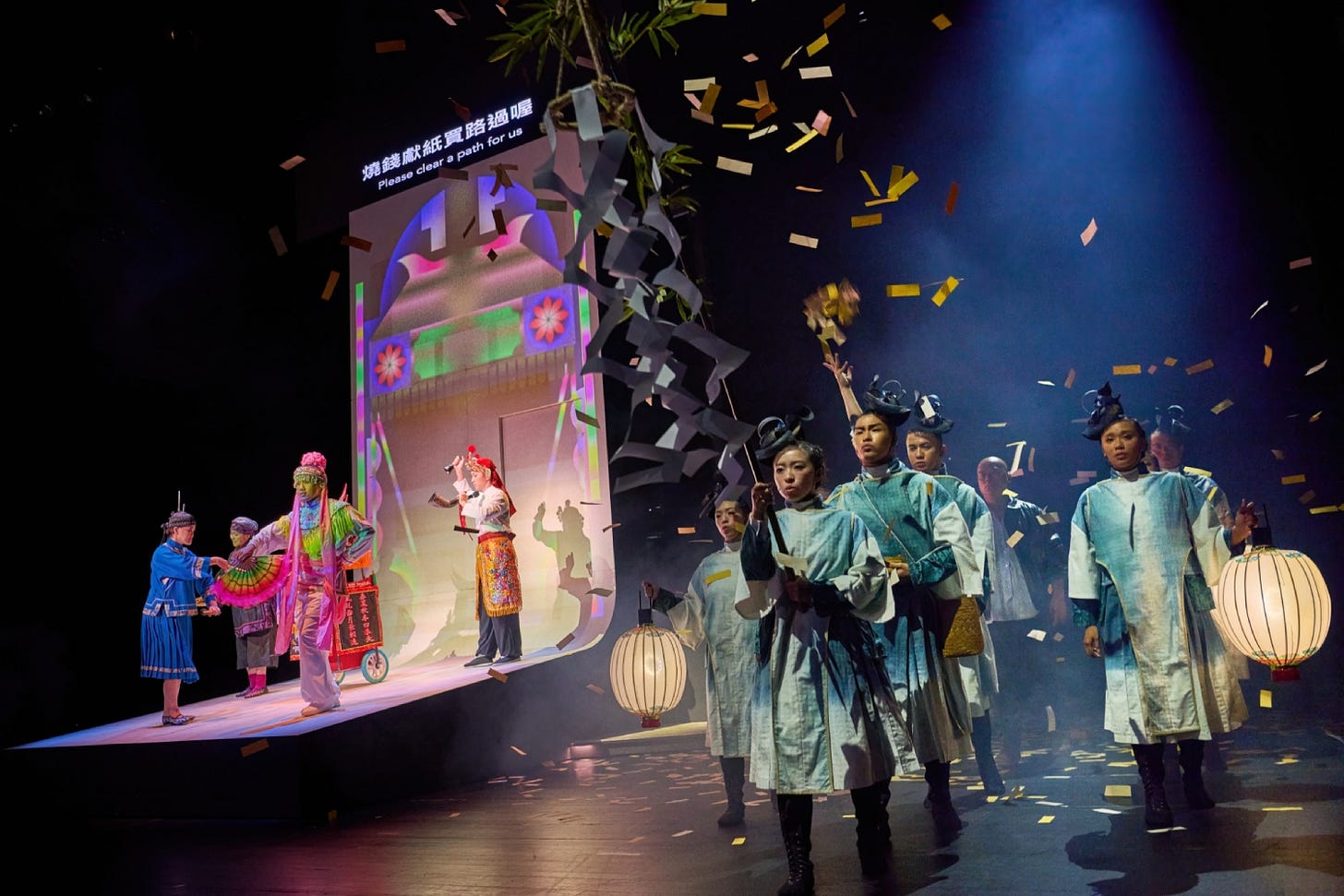THIS TAIWANESE MUSICAL HIT IS GEARING UP TO CROSS THE PACIFIC
How producers and creators of 'Don't Cry, Dancing Girls' hope to adapt their popular show into a Stateside success
Welcome to your weekly guide to the global theater industry. New to Jaques? Check out this handy explainer.
How do you take a local hit to the world stage?
That’s the question now facing the producers of Don’t Cry, Dancing Girls, a sellout Taiwanese musical that got its first New York showcase late last month.
The abridged version of the show, performed in Mandarin and Taiwanese Hokkien with supertitles and an English-language narrator, kept a relatively low Stateside profile with four invite-only, Off Broadway performances. Even so, the wait list hit 500 people—and back in Taiwan, the title has been selling out at venues around the country since it premiered in 2023.
In Don’t Cry, Dancing Girls, three sisters return to their smalltown family home in Huwei Township in the wake of their father’s death—and soon get caught up trying to score a hefty family inheritance. The only catch: They’ve got to fulfill their second great-uncle’s dying wish by performing the pageant-like, soul-guiding ritual known as khan-bông. The musical’s tone is both heartfelt and comic, and the language is humorously profane enough to inspire a minor internet controversy (more on that in a minute). The father’s ghost is a major character. There are shenanigans involving gangsters.
The musical has not only proven successful at performing arts centers around Taiwan (where runs tends to be much shorter than in the U.S.), but it’s also drawn fans in separate, concert-style presentations of the songs performed with more rock-influenced arrangements.
This breakout commercial success has spurred the show’s director, Hui-Cheng Tseng, to trying taking it international. “The popularity of the show has been like an avalanche,” Tseng tells me. “The connection with the audience has been so strong and so unexpected that I think there’s some potential there.”
A Taiwanese alum of NYU’s graduate musical theater program, Tseng is now the artistic director of Taipei-based VMTheatre Company. For this initial push to New York, VM has teamed with American producer Ken Dingledine as well as executive producer Barbara Darwall (Blue Man Group, King Kong).
Last month’s brief run at the Off Broadway complex Theatre Row served as a means of testing the international waters. “I wanted to see if the emotional impact would be there for New York audiences, and I think we proved that it resonates,” Dingledine says. “Now we’re ready to move on to the next stage.”
Just a few years ago, the challenge of turning an Asian stage favorite into a Broadway success would have seemed an unprecedented challenge. But now, with the Korean-born Maybe Happy Ending and a Korean-backed The Great Gatsby both going strong on Broadway and Japan’s 2.5D Musicals finding American fans, the industry seems more open than ever to cultural crossovers.
But what the next stage looks like for Don’t Cry, Dancing Girls is still under discussion as producers and creatives alike ponder the nuances of translation, adaptation, and cultural specificity. In this SPOTLIGHT STORY, I’ll highlight
the markers of the show’s success back home,
the social media controversy that gave the title its earliest signal boost,
the outstanding questions facing the upcoming adaptation,
how producers are assembling an international team of backers for the project, and
the fingers-crossed development timeline they’ve got in mind.
Let’s meet the Dancing Girls.
BRINGING A BIT OF BROADWAY BACK TO TAIPEI
After his time at NYU, Tseng returned to Asia and had a stint as an actor, appearing in the Mandarin-language tour of Mamma Mia! that launched in 2011. When he started working as a director, he recalls, he was using rehearsal practices and a development process he’d become familiar with in New York—and which were foreign to the Taiwanese industry.
A directorial suggestion that an acting ensemble speak the lyrics of their songs to each other—a technique to help actors focus on the emotions and intentions behind the words—resulted in angry emails from one of the casts he worked with. And for one show, he arranged four weeks in a theater to allow for two weeks of technical rehearsals prior to two weeks of performances. “At that time, nobody did this,” Tseng says of the Taiwanese industry, which was then (and still is) accustomed to a far more hurried pace.
Experiences like those, and the impulse to work with regular collaborators familiar with his process, drove Tseng to launch VMTheatre Company, a nonprofit funded both by the government and by income from ticket sales. (VM also has a relationship with the commercial music company Sonicues.)
One of Tseng’s regular artistic collaborators, the book writer-lyricist Zhan Jie, first mentioned the idea for Don’t Cry, Dancing Girls a few years ago, at the opening night of the previous show they’d worked on together. “He told me he had this idea of doing a version of Chekhov with three sisters and khan-bông,” Tseng say. “I thought it would be something really serious.”
But the new show, by Jie and composer Ho-Shiang Kan, turned out to be more of an antic comedy, balancing its reflections on death, family and tradition with hijinks and foul language. An initial reading was produced with the state-supported Kaohsiung Center for the Arts in southern Taiwan, followed by two more readings in Taipei.
Soon thereafter, in spring 2022, Taiwan’s late-breaking COVID wave hit. And that’s when Don’t Cry, Dancing Girls caused a ruckus on social media.
THE VIRAL MOMENT
Keep reading with a 7-day free trial
Subscribe to Jaques to keep reading this post and get 7 days of free access to the full post archives.




